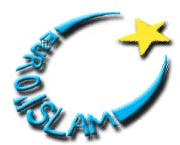 |
 |
|
 |
*the euroislam project* |
Events
|
||||
|
Agora Izmir Final Conference Passau Iasi EBM Valetta - Forli Various Events |
by Judith Zijlstra
Before discussing the impact and features of multicultural societies in Europe and the challenges connected with them, we defined the two main subjects which characterize the discussion: culture and Multiculturalism.
By the way of brainstorming, it was revealed that culture helps people to find their own cultural identity by defining common features such as a way of living, collective heritage and values, a common language and norms, traditions and habits. People show that they are belonging to a certain culture by sharing the same habits and taboos which are often communicated by the educational system. Being asked what they connect with Multiculturalism, participants named features such as dialogue, knowledge, going beyond one’s own culture, removing stereotypes and the peaceful coexistence of different religions.
As multicultural societies emerge through migration, the second step to understand the problems and challenges connected with Multiculturalism were found by analysing and discussing the history of immigration: People have been moving for ages and mostly, immigration was welcome, i. e. during the times of diseases in 17th century. In 20th and 21st century, immigration could expand through easy ways of travelling which cause the view that EU is flushed by immigrants who bring with them their own culture which is often very different from the European one.
Yet, is this “import of culture” a restricted to people who come to Europe? To answer these questions participants explained what they know about people from their countries who went abroad. People of all present nationalities took with them their culture when going abroad and needed more than one generation to integrate at least partly. Today, many Europeans have forgot about their past and lost their empathy when complaining about immigrants. Not just Muslims but also Christian Europeans stick to their culture when immigrating. This is a cultural tendency which is not connected to Islam. The progress of change and assimilation takes at least two generations. It is hard to say whether we should change the way, immigrants live in their country.
Despite this knowledge, the existence of (sometimes hidden) prejudices against migrants is quite common in European societies, as a discussion of controversial theses revealed. To see whether these prejudices are justified, participants were asked to defend theses such as “Islam is not compatible with European society”. All these statements were hard – if not impossible – to be defended because they represent prejudices which are not logic.
From this discussion participants took conclusions on Multiculturalism that reflects the positive features as well as the problems connected with multicultural societies: Multiculturalism can be defined as: a) people living next to each other without mixing their cultures and without searching for common features b) as a colourful society where every colour should have its place.
The living together of different cultures can be improved but therefore the involvement of all stakeholders is needed. There are a lot of economical and educational boundaries that have to be reduced.
|



